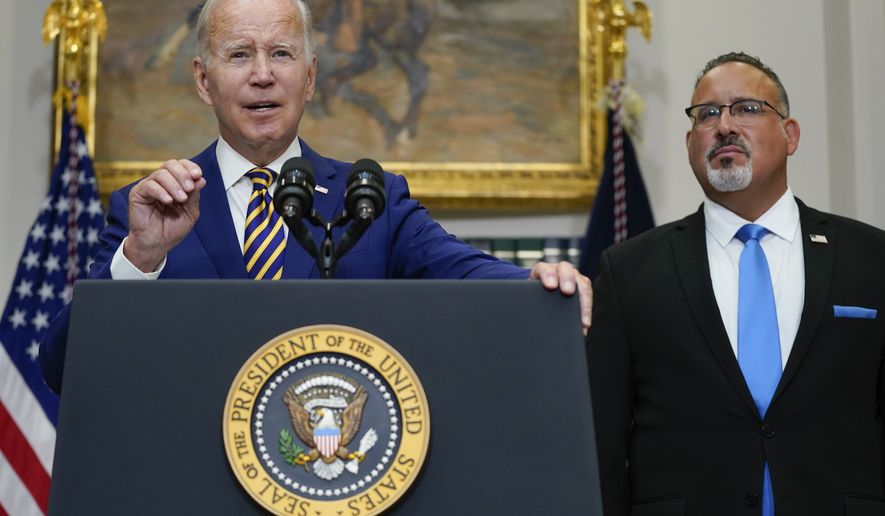President Biden’s plan to cancel billions in student loan debt hit what’s thought to be its first legal snag on Tuesday with a lawsuit alleging the move is an illegal overreach by the administration that would increase state tax burdens for some who have their debt forgiven automatically.
The Pacific Legal Foundation, a public interest law firm in California, filed a suit in federal court in Indiana on behalf of Frank Garrison, an Indiana-based public interest attorney and employee of the foundation.
Mr. Garrison’s case is believed to be the first of many lawsuits expected in response to Mr. Biden’s student debt write-off.
“Congress did not authorize the executive branch to unilaterally cancel student debt,” said Caleb Kruckenberg, an attorney at the libertarian-leaning foundation. “It’s flagrantly illegal for the executive branch to create a $500 billion program by press release, and without statutory authority or even the basic notice and comment procedure for new regulations.”
The complaint names the Department of Education and Secretary of Education Miguel Cardona as defendants.
Mr. Garrison says that he has been paying off his loans for the past six years under a federal program that forgives student loans for nonprofit and public service workers after 10 years of payments.
SEE ALSO: Women outnumber men in the college-educated workforce: study
He says he is among hundreds of thousands of public interest workers in several states who will be slapped with tax bills under the new debt forgiveness plan, making them worse off financially.
Mr. Garrison says he chose to take a lower salary as a public interest attorney, in part, because of the loan forgiveness under what is known as the Public Service Loan Forgiveness program, or PSLF, which had been previously authorized by Congress.
Borrowers in Wisconsin, North Carolina, Minnesota, Mississippi and Arkansas who are repaying their loans under the PSLF program could be hit with similar tax bills under the president’s forgiveness plan, according to the Pacific Legal Foundation.
Mr. Biden unveiled his long-awaited plan last month, which includes canceling $10,000 in student debt for borrowers who earn less than $125,000 per year and an additional $10,000 in debt for Pell Grants recipients.
Mr. Biden’s plan calls for lowering monthly payments on outstanding undergraduate loans from 10% to 5% of discretionary income, and forgives loan balances after 10 years of payments, instead of 20 years for original loan balances of $12,000 or less.
He also announced one “final” pause on federal student loan repayments brought on by the COVID-19 pandemic through December.
Attorneys at the foundation representing Mr. Garrison say Mr. Biden’s debt write-off plan is a “political move” ahead of the November midterms that “has been rushed, is ill thought out, and will have significant unintended consequences for borrowers, students, colleges, and the economy in general.”
Beyond creating added tax burdens for those repaying their loans under PSLF, Mr. Biden’s plan “is unjust to those who have paid their loans or never took any,” said Steve Simpson, a senior attorney at Pacific Legal Foundation.
“Loan cancellation will make Americans more divided, as those who paid their loans — or never went to college — will have good reason to think that we no longer have a government of, by, and for the people,” he said.
The plan is getting flak from the left and the right and is likely to face significant legal scrutiny.
Some liberals said Mr. Biden didn’t do enough. They wanted him to cancel $50,000 or more per borrower. Republicans said the bailout, which is estimated to cost taxpayers as much as $600 billion, would primarily benefit wealthy people who are on a high-earning career path.
They also faulted it for being more out-of-control spending from Democrats. Republicans insist that increased government spending is a key driver behind inflation.
The Congressional Budget Office estimates that the plan will cost taxpayers $400 billion.
The CBO also estimates that the pause on federal student loan payments through December, which Mr. Biden announced last month along with the debt write-off, will cost an additional $20 billion.
The $420 billion total figure, which is in line with outside estimates, is one more data point worrying budget hawks that Mr. Biden’s debt cancellation plan will further inflame inflation and wipe out his administration’s progress on reducing the deficit.
“This might be the most costly executive action in history,” said Maya MacGuineas, the president of the nonpartisan Committee for a Responsible Federal Budget. “It’s unacceptable that the president would implement it without offsets and without congressional approval.”
“With inflation at a 40-year high and the national debt approaching record levels, we shouldn’t be adding to deficits — certainly not by executive fiat,” she said.
• Joseph Clark can be reached at jclark@washingtontimes.com.




Please read our comment policy before commenting.